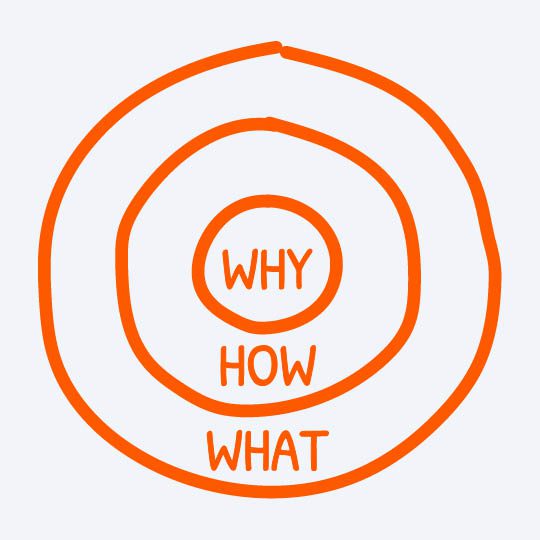Any time you recenter your growth strategy, it’s useful to reconnect with the “why” driving your mission in the first place. And, if it’s been a while since you defined your “why”—it’s also worth considering, “why now?” This foundation will help you build a more effective growth plan and content strategy.
Starting with ‘Why’ for Business Planning
You’ve reached a pivotal moment: perhaps you’re doing your annual planning or re-evaluating strategy after a quarter of sluggish growth. Maybe you need to expand your sales pipeline or grow brand awareness. You’ve tried increasing your ad spend or attending more conferences, but you’re not seeing results. You’re frustrated and not sure where to start. You know something needs to shift.
In the words of mindfulness teacher Pema Chodron, you might need to “start where you are.” And, in the words of famous thought leader Simon Sinek, this is a great time to start with your “why.”
15 years after Simon Sinek’s TED talk on this topic went viral, it remains one of the most viewed of all time. In case it’s been a while, here’s a refresher.

Image Source: SimonSinek.com
Sinek posits the idea of a “golden circle.” (See picture above.) Most businesses find it easier to highlight the outer edges of it first—the details that he calls the “what.” These are the tangible products or services being offered. For example, as a B2B healthcare company, you might offer IT or billing services to hospitals or provider groups.
From there, the circle moves inwards, to denote the “how,” i.e. the way your business delivers its services, and how this approach stands out. Perhaps you offer specialized industry expertise; maybe your team offers an uncommon level of service. Maybe you have more sophisticated technology than your competitors. When differentiating yourself in a sea of options; “how” is what makes you unique.
Meanwhile, your “why” sits at the center of the circle. This is your purpose. It answers:
- Why did you found your company?
- What drew you to work there?
- What drives you to keep showing up day after day?
- Why are you committed to making this offering available in the world?
- Why should other people listen?
As Sinek puts it, most businesses go from the outside in (what-how-why), when they should be leading from the inside out, (why-how-what). As he famously said, “People don’t buy what you do, they buy why you do it.”
Applying this Exercise to Marketing Planning and Growth Strategy
Connecting with your “why” helps close the gap between what you invest time in and what drives your mission and growth goals. Let’s explore how this applies to those of us responsible for growing companies and how we can use it to focus our strategic planning.
The most common strategic planning challenge we see is a lack of focus, usually in the form of not leaning into the cross-section of what organizations do best and what the market wants most. Often companies have a lot they can offer but struggle to focus on their best-value offering. This leads to a diluted marketing budget, and not surprisingly, limited results. Other times, lack of focus leads to failure to launch: no consensus on a plan means no meaningful growth efforts can move forward.
It boils down to this: if you don’t know where you want to go, you can’t chart a route to get there.
This is why we always start by reorienting to core purpose and goals–a worthwhile exercise no matter an organization’s age. In the case of a company that’s been around for a long time, the original mission or intention might feel a bit out of reach. In the case of a company that’s still finding its footing, that mission and intention might need to be further teased out and crystallized.
Digging Deeper to Discover Your “Why”—and “Why Now”
Any effective business development or marketing plan starts with reconnecting with these questions:
- Why did you start your business?
- Why do you exist?
- What is your mission?
- Why do you want to work on this now?
- Why is this a priority?
Take some time to answer these questions without overthinking, off-the-cuff. Then consider:
- How does what you wrote compare to the mission listed on your website?
- How does it compare to what you share in pitch meetings?
- Did anything you say surprise you?
- Are your answers reflected in your collateral?
- Does your origin story and purpose come through in your conversations with prospects?
- Regarding the fourth question, is it possible that your “why now” is slightly different than your original governing “why”? If so, take note. We’ll come back to this one.
There are no wrong answers here, only observations.
From what we’ve found, organizations often fill ad-hoc needs to support specific campaigns. This makes sense. When you’re trying to keep up with the everyday demands of serving clients and meeting KPIs, it can be hard to make time for deeper reflection. You’re in “putting out fires” mode.
But the problem is that when you’re constantly reacting to the needs of the moment, you can end up far from where you originally set out to be. For example, you might spend all your time making sales flyers for one-off needs rather than building a meaningful library of case studies and whitepapers that showcase your best success stories and driving mission. Meanwhile, creating a cohesive and proactive strategy based on what your company does best makes your efforts more effective.
Now go back to the notes you wrote on “why now” above. Next, try listing out your top 3 business goals for the year.
Here are some important questions we typically start with:
- Are you looking to attract new opportunities in a certain geographic area, specialty, or facility size?
- Do you want to challenge yourself to generate topics that are relevant to that specific segment?
- Are you encouraging existing clients to expand to new services? If so, what are you telling them when you explain “why” they should take these on?
When you define your “why” and “why now” and create from these, you have a better chance of developing the kind of content that your ideal clients will have an emotional resonance with. Let’s dive deeper.
Define Your “Why” Because Every Decision is an Emotional One
Helping customers “feel good” is a very important part of marketing. As Sinek discusses, the part of our brain that makes decisions is not focused on the logical (how/what), but on the emotional. In fact, according to an article profiling the neuroscience behind marketing, the logical neocortex only rules about 5% of our choices, whereas the limbic system is 95% responsible for decision-making.
The article states, “your limbic system forms your emotions. Your hippocampus, hypothalamus, and amygdala comprise this center of sentiments, memories, and most importantly, actions. It’s the part of your brain that’s most connected to most decisions you make, and it longs for purpose. While the reptilian brain seeks food and shelter, the limbic brain seeks connection and fulfillment. This is the key to the consumer’s heart.”
In fact, in a later exercise on “finding your why,” Sinek himself suggests asking a good friend to describe why you’re close. Most people will initially struggle, he says, describing attributes at first—that you’re fun, smart, kind, etc. But eventually, they will give up and start talking about what it is you make them feel. For example: “You make me feel safe, taken care of, you always make me laugh,” etc.
Sinek describes doing the exercise with one of his friends, who relayed that he felt inspired in Simon’s presence like he could do anything. Sinek describes getting goosebumps at hearing this. It was a visceral, physical feeling—one that brought up an emotional reaction. And this, Sinek says, is what you should look for— welling up with tears being another example. This is where your “why” lives. In other words, a felt sense that tells you you’ve happened upon something special, something you know in your body to be true.
As Sinek describes it, this “why” can be summed as the thing you give to the world. It’s the special place one fills in the world, the energy and value one brings. In much the same way, your customers will feel this sense, this specialness, when connected with marketing that comes from a core value, a core guiding purpose that is driving your business (or team) forward.
Said another way, passion is infectious. From what we’ve found in helping organizations connect with their driving “why,” when marketing is focused and tied directly to what the company cares about and what they do best—the client is much more likely to care too. Passion attracts customers, makes them feel special, and excites them.
Putting the ‘Why’ Into Practice in B2B Healthcare
Here’s why defining your “why” is so important in B2B healthcare. Many of the services provided are commoditized—revenue cycle management, credentialing, staffing, IT—they are all things that have to get done. All the services provided and “differentiators” touted sound eerily similar— being high quality, patient-focused, secure, compliant, service-oriented, etc. Those are the price of admission.
But actually, keeping current customers and building partnerships with new ones in B2B healthcare hinges on your ability to connect relationally with your customers and prospects.
After years of interviewing our partner’s customers for case studies and testimonial interviews, one thing is clear—your customers don’t buy your suite of services per se, they buy who you are, how you do what you do, and how being your partner makes them feel.
Before they mention results, they mention the emotional impact of having a partner they trust. They value a clearly defined “why,” the passion behind your reason for existing, as well as your approach.
Examples of compelling motivations (and messaging) include:
- An IT company that is committed to bringing customers peace of mind by reducing physician burnout and improving patient care.
- A logistics company that was started solely to meet the needs of pharmaceutical manufacturers after the founders themselves spent years looking for a partner like that.
- A physician staffing company focused on being a caring, service-focused team after working with companies that were transactional and impersonal.
- A revenue cycle management company that aims to be the holistic problem-solving partner they wished they had when their founder was a CFO.
The key is to weave in that driving passion into the stories you tell when promoting your company. Then you must keep telling those stories, over and over, as the healthcare B2B sales process can take months, and even years, to come to fruition. Over a cumulative set of interactions, your prospects will remember how your conversations made them feel.
Most marketing focuses on the “how” and the “what,” i.e. the features of the product or service and the metrics it delivers. But “why”-driven marketing calls customers to connect with your company on a deeper emotional level. They understand that in supporting this company they are also supporting the providers and/or patients their clients ultimately serve. In the long run, your customers remain loyal when they feel emotionally connected and in alignment with the passion that motivates you.
The Bottom Line: Connecting with Your Why Will Reignite Growth
Taking time to recenter on your “why” will help you focus your growth efforts, tell relatable and helpful stories, and build meaningful connections with customers and prospects. There is an infectious, passionate energy behind marketing that feels real and aligned with an organization’s driving purpose. When you focus on the cross-section between why you do what you do, what you do best, and what the market needs—you have all the elements of a truly effective growth plan.
We Can Help You Tell Authentic Stories that Reflect your “Why”
If you’re looking for support articulating your driving mission, defining a focused growth plan, and telling meaningful success stories to support your marketing efforts, Slabtown Marketing can help. For more than a decade, we’ve helped B2B healthcare companies grow through purpose-driven marketing. Contact us to learn more.




